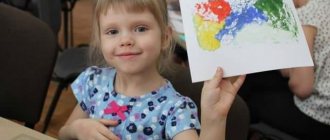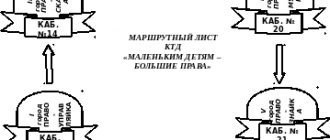- 4095
- 20-03-2019
- Author: Mysekret Team
- 0
During this difficult but interesting period, when a child turns from a toddler into a preschooler, the formation of his personality, attitude towards the world around him and his own actions is in full swing. Raising children of this age is a responsible and difficult moment for parents who want to raise a happy and smart person. At this age, the foundation of personality is laid on which the child’s character, skills and abilities will develop.
Features of raising preschool children
The process of raising a child at this age is carried out in two directions:
- Personal development;
- Preparation for school.
One cannot but agree that education should include approaches from both points of view. It is important both to teach your child good things and develop character strengths, and to prepare him for school life by instilling responsibility and social skills.
See also...
✅ Subtleties and secrets of family education of children
✅ Psychology of raising a child from 1 year to 2 years
✅ Tips on how to raise a boy to be a real man
✅ Raising children from 0 to 3 years old tips
Psychological characteristics
In raising children, parents usually use three main psychological models. Most often they are used separately from each other, but each model has its pros and cons.
The authoritarian model is clearly visible when a parent strives to achieve from a child a result that is convenient for him, putting his own opinion above the child’s opinion. The child's disobedience or failures are punished, and correct actions are approved. The advantages of this model include:
- The child clearly understands the parent’s instructions;
- Full understanding of responsibility for one’s actions and the consequences of performing a task incorrectly.
There are many more disadvantages, and their consequences are very noticeable:
- Getting used to the parent’s authoritarianism, the child takes his opinion on faith and stops thinking with his own head;
- The action of the authoritarian model gives rise to the child's fear of his parents;
- The child becomes uninitiative and imitates the behavior pattern of his parents.
Inductive method - in the process of education, communication takes place with the child, during which the solution to the problem is found with him. The child learns to make decisions and draw conclusions himself, and also takes on some responsibility. The advantages of the inductive method include:
- Early development of responsibility;
- The child quickly begins to learn to think and think for himself;
- The child takes initiative;
- It turns out that he is more prepared for life.
There are several disadvantages to induction:
- A complex and subtle approach to application - a parent cannot always understand when responsibility can be transferred to the child;
- At the fragile age of 4-6 years, the words “decide for yourself” or “everything is in your hands” may not be entirely appropriate;
- If you shift too much responsibility onto a child, he may feel lonely and lose faith in himself.
The model of criticism or hatred is a common model that many adults use, most of them unconsciously. The moral in this case is different for everyone, but the model is the same: in case of bad behavior, the child is punished by silence or resentment of the parents and forgiveness does not occur until the child realizes the mistake and asks for forgiveness. It is difficult to attribute anything to the advantages of this technique, but they are:
- Development of, albeit a very painful, but clear sense of responsibility for one’s actions;
- The child weighs his every action and asks himself whether he will be scolded for it;
- At a subconscious level, boundaries are set in behavior that the child should not go beyond.
There are several disadvantages, but they are quite destructive:
- A child can receive psychological trauma due to constant feelings of fear, anxiety and doubt; feelings of guilt can haunt him almost every second;
- It becomes much more difficult for a child to trust his parents and fear of them leads to isolation.
Any of these models in their pure form can harm the child’s psyche. However, with a harmonious combination of pros and cons, you can find the perfect balance.
Basic Rules
If we consider the actively promoted principles of pedagogical education in modern conditions, it turns out that the methods that were relevant during the Soviet era are outdated. The method of instilling feelings of guilt and shame, belittling children's authority, coercion and prohibitions have not only lost their popularity, but are also considered negative. Nowadays, psychologists recommend basing the educational process on mutual respect and trust between children and adults.
Teachers recommend that all parents apply simple rules when communicating with their children:
- Respect the personality of the child, do not allow any kind of violence towards him and do not humiliate him;
- Control, but give freedom of choice;
- From an early age, provide children with the necessary conditions so that the process of mastering skills and knowledge occurs efficiently;
- Helping the child make a choice or conclusions, explain to him all the pros and cons;
- Set rules and requirements, taking care of the child’s positive attitude towards them;
- Communicate as much and as often as possible with the child in order to develop mutual understanding and develop subconscious skills, the formation of speech and social culture;
- Develop responsibility and confidence in children, supporting any endeavors and initiatives;
- When choosing a model of education, organize the unity of the pedagogical process, demanding that other close adults support it;
- Take into account the age, abilities, character and temperament of the preschooler;
- Avoid prohibitions and false promises;
- Gradually, as the child grows, give him more independence;
- Work on yourself in order to be the best example for your child.
At first glance, these rules are simple and understandable, but compliance with each of them is extremely important for a preschooler to grow up developed and capable.
Nutrition
Each child perceives a regular meal in kindergarten differently. Some completely refuse food, since it is completely different from their mother’s. Others, on the contrary, happily gobble up semolina porridge, leaving the plate clean - it tastes better!
Be sure to ask the teacher how your child eats, what he eats better, what he refuses. If there are any nuances in eating at home, this must be explained to the teacher so that the child is not forced to eat, using the good old “for mom” for dad..."
Group work using the Montessori method
Areas of development of a preschool child
The four to six year period is the time of the first age crisis in a person’s life. At this age, children begin to rethink their usual life and actively follow the example of their parents and adults. And the main task of the parent at this time is to form in the child a sense of responsibility for the actions he commits. In addition, it is necessary to develop a child according to the following principles:
- Physical education;
- Intellectual;
- Moral;
- Social;
- Labor.
For the correct formation of a healthy personality, education must be carried out according to all principles at once.
Physical education
It is not for nothing that the saying “A healthy mind in a healthy body” is so popular among teachers. Numerous studies have shown that children who are healthy, physically active and have good vitality learn information faster and better. Therefore, physical development is the first area in which it is necessary to raise a child. Teachers recommend:
- Provide your child with a strict daily routine and teach him to adhere to it independently;
- Start the day with exercise and exercise;
- Walk with your child in the fresh air every day, without passing by playgrounds and exercise equipment;
- Provide him with accessories for active recreation: bicycle, scooter, balls, comfortable running shoes;
- When the child reaches the required age, choose a sports section that will not only provide further physical education, but will also please the child.
If initially the parents’ task is to ensure physical development, then by the age of seven the child must take care of it mostly independently. In addition, it is extremely important that the child understands the importance of physical development.
Intellectual
The most important component of psychological education is intellectual development. This is a set of pedagogical actions, the purpose of which is to develop the mind of a growing child through the transfer of experience, knowledge, skills, abilities, as well as the norms of behavior inherent in the generation, rules and assessments.
Depending on the age of the child, intellectual development is divided into stages:
- 1-3 years;
- 4-6 years;
- 6-7 years.
At the beginning of the first or second year of life, the baby’s intellect develops according to the principle of visual and effective thinking. He explores the new world in a tactile, gustatory and olfactory way. The goal of parents at this age is to introduce the baby to new objects and ways to use them.
By the age of four to six years, thinking changes to visual-figurative. While still unfamiliar with any concepts, children create visual images about them. During this period, the most important condition for upbringing and development is a good atmosphere in the family, where parents love and are ready to answer all questions and needs.
After six years, the child’s thinking becomes more playful. During this period, for the purpose of intellectual education, education can be organized in the form of games that promote concentration, imagination and creation: feeding dolls, modeling from plasticine, drawing, board games. In addition to such games, there must be logic games, the purpose of which is to form mathematical functions of brain activity: puzzles. mosaic, constructors.
Moral
Moral education consists of explaining the norms and rules of behavior. Understanding these norms is individual for each parent; we can only recommend ways in which morality is instilled at different ages:
- Until the age of 1 year, children do not understand what is “good” and what is “bad,” and parents can only show them the correct model of behavior by their own example. By showing affection and love, parents cultivate confidence and positive thinking in their child.
- Until the age of 2 years, the main tactics of parents should be to prevent situations in which the child might act “badly” instead of scolding him for it. For example, close the closet instead of scolding the child for getting into it, not going to the store before eating so that he does not eat sweets and does not ask to buy them. Avoid complex disciplinary measures and think ahead.
- Between 2 and 4 years old, children have difficulty understanding abstract things: truth, generosity, support. Give your children real examples, simple metaphors, and firmly stop bad behavior, doing it calmly and kindly.
- Between 4 and 5 years comes the most favorable time for strengthening moral standards. Children already have an excellent understanding of abstract concepts and easily absorb various examples, especially those that are nearby. At this age, kids want to be like the people close to them and make them happy, so well-deserved praise and encouragement motivates them in the best possible way.
- After 6 years, social responsibility begins to develop. At this age, the child needs to be explained that other people have rights that must be respected, as well as set boundaries and rules of behavior in society.
Further work on moral education is carried out after 7 years and here parents are helped, and in certain cases, unfortunately, school, friends and other people interfere.
Social
The process of social education of preschoolers includes the transfer to them of a system of values, norms of behavior and generally accepted knowledge about society, and depends on the culture, nation and characteristics of the place of residence. Moral norms, value orientations and standards of behavior are determined for a child, first of all, by his family, thereby shaping his personality.
The nature of communication among preschool children is non-situational and cognitive: children are interested in many different issues, and speech becomes their main means of communication. The desire of children of this age is to gain knowledge about the world that surrounds them by asking adults questions and observing their behavior. At the same time, one’s own path of knowledge is formed—personal. A child needs to compare himself and other people with each other, so a critical aspect of social education at this age is communication with peers and adults.
It is most convenient to carry out social education within the framework of games: the nature of a child’s actions can say a lot about his temperament and methods of influencing others. By observing him during games, you can identify the pros and cons of your baby's social skills.
Labor
Labor education is another important factor in the development of psychological responsibility. In preschool age, responsibility, skills and desire for work are formed, so it is extremely important to accustom a child to work, starting from 4-5 years. Parents' activities should include the following:
- Assistance in determining work goals;
- Discussion of the labor process;
- Discussion of the morality of work and its purpose: why and for whom it is being done, what it will give;
- Teaching a child how to plan step-by-step activities: how to correctly perform a particular task step by step;
- Awakening interest in work and nourishing it;
- The discussion of the results;
- Encouraging the child’s efforts, interest and desire to work;
- Checking and evaluating the progress of work and its results together with the child;
- Involving a preschooler in a joint labor process;
- Setting the right responsible example;
- Help with advice or deed;
- Awakening the child’s initiative to make decisions and start working.
Labor develops intelligence, attentiveness, memory, concentration and observation in a four to six year old child, and also has a positive effect on health.
Incentive sphere
Preschool childhood is a key and very important period of personality development. It is now that the formation of the main motives that will encourage the child to activity takes place. What is its specificity?
Motives appear related to the fact that the child strives to join adult life, to become more like his parents or their friends, to live like them. Often such motives are intertwined with the game, so kids often have fun playing “Mothers and Daughters”, “Shop” and the like.
In addition, we highlight the following motives:
To be better than peers, a competitive element. Establishing and maintaining positive relationships with adults
It is extremely important for a child to be singled out, praised, and rejoiced at his achievements. Moral motives are obedience, helping others, the desire to somehow please them. The motives for learning are the acquisition of knowledge, skills and abilities. It is common for a preschooler not to wait for praise, but to make certain efforts to receive it
In addition, it is during this period that a hierarchy of motives arises, their subordination
It is common for a preschooler not to wait for praise, but to make some efforts to receive it. In addition, it is during this period that a hierarchy of motives arises, their subordination.
Author's methods of education
Nowadays, many new materials and methods for raising children have appeared. Psychologists from all over the world confidently recommend that parents of preschoolers take a closer look at such methods as:
- The Nikitin method is raising healthy and smart children. Classical teachers Boris and Elena Nikitin recommend starting children's education by observing them, as well as by preparing the environment for their proper development. This includes: tables, alphabet, maps hung in the right places, exercise equipment, sports equipment, cubes, puzzles and other elements of the educational system;
- The Montessori method is a comprehensive education, the main idea of which is the thesis that children should first be taught writing, and then counting and reading. The Montessori method is aimed at cognitive, labor, moral and social development;
- The "lazy mom" method. The method of Russian psychologist Anna Bykova, which appeared relatively recently, but has already gained enormous popularity, is to raise independent children, developing in them the skills of cognition, understanding and finding solutions from childhood. The method is extremely simple and effective, it consists of explaining and setting an example by parents;
- Doman's method. This technique was created by an American pediatrician and is intended to develop mental abilities from an early age until the age of seven. It is based on the belief that children can endlessly absorb information from pictures and words. The famous Doman cards help with this, as well as exercises for the early development of speech, reading speed, curiosity and vocabulary.
There are a huge number of similar methods, but each parent has his own character and style of behavior, so rarely does anyone become an adherent of exclusively one method. A much more frequent and most optimal option is the “from everywhere” principle - when the best and most important is taken from each system.
Personality – man – individuality
Not so long ago, in that unforgettable Soviet era, there was almost no talk about personality. We raised a child, prepared a citizen of a great country, a part of society. Yes, the education of society was the main goal. Today it is she who is the center of pedagogy and psychology. And the word became fashionable, only the lazy mother did not mention what an interesting “personality” her child is. So what is it?
There are three main concepts: man, personality, individuality. Many are sure that in essence they are the same thing. But it is not so.
Man - This is the definition. A concept that indicates that an individual belongs to the human race. Man is a unique creation. This is the unity of biological and social principles. On the one hand, he is a biological being, and on the other, a social one. Therefore, it depends on physiological laws and on society. Personality. This is the subject of our conversation
This is the most important thing in a person, his spiritual fulfillment, his social attribute. This is what a man is
His attitude towards society and social status are his personality. In other words, if “man” is a vessel, then “personality” is its content. Individuality is a set of those features that distinguish a person from others. Temperament, physical characteristics, intelligence, character, views, mentality, emotionality and life experience. Individuality is the first sign of personality.
Psychologists and teachers set themselves the task of identifying the most effective conditions for the full harmonious formation of personality. By formation we mean social, professional, cultural and physical development. This also includes the cultivation of abilities (musical, artistic, managerial) and personal qualities (will, patience). We take development as an indicator of the level of development.
The function of the individual lies in the development of experience, in the inclusion of a person in the social system of relations. In other words, a person is formed, manifests and exists in society, being its component.
Problems of raising preschool children
It is natural that all parents face problems in raising children. Children may not succumb to one or another type of upbringing, may not listen to their parents and act in their own way, which sometimes makes you want to give up. However, in the vast majority of cases, such problems arise due to common mistakes that parents make. Eg:
- Hyperprotection . Excessive care, surrounding the child with hypertrophied attention and parents’ worry about every mistake leads to the development of symbiosis or “interpenetration”. In this case, the relationship between parent and child becomes too close and destroys the latter’s personal qualities and character. This signals the parents’ lack of confidence both in themselves and in the child, about the centralization of his personality as the meaning of his own life.
- Totalitarian authority . Often parents put pressure on their child with multiple demands, a ruthless attitude and uncompromising conditions. For them, the child’s success and society’s opinion of him are more important, while the child’s feelings and desires play a much smaller role. Such children can grow up to be insecure, anxious and suspicious individuals.
- Rejection . Various situations happen in life: divorce, difficult childbirth, violence. Not every parent can cope with problems and not associate their child with bad memories. Rejection is emotional in nature and has dire consequences - a child who is tolerated simply because there is nowhere else to put him, suffers educationally, and receives constant punishment and cruel treatment.
- Indulgence . Hyperprotection is the scourge of modern families, where the interests of all participants depend on the wishes of the child. In such a situation, the ability to sensibly assess the situation and treat both successes and failures adequately is lost. The reason for excessive indulgence is not always a strong love for the baby, but also the unmet needs of the parents themselves.
If there is at least one of the problems described above, it is worth switching from the thought “Why is the child not amenable to education?” to the thought “Why can’t I raise him?” The problem must be solved as quickly as possible and the reasons for its occurrence must be looked for in oneself. And in this case, you should not refuse the help of a psychologist, since the reason may lie very deep.
Share with your friends!
more
Read us in the Zen channel
The role of the family in shaping the personality of a preschooler
In the family, everything influences the formation of a preschooler’s personality. Starting from the family structure (the classic triangle father-mother-child or the absence of a father, the presence of other children or grandmothers), parenting style to the accepted forms of expression of emotions.
It is obvious that every child needs a father. If he is absent, the role of the father is inevitably filled by other family members. A preschooler's awareness of maternal and paternal functions is disrupted; boys are deprived of a model of male behavior in the family. Now we have touched only on the characteristics that lie on the surface. Features of family structure are an unusually deep topic.
Some families have a tradition of getting their way through whims and insults. This method is sure to be adopted by children with a choleric temperament. If it is effective, capriciousness becomes one of the main personality traits of the child. Then the problem arises: how to educate without punishment.
Preschoolers quickly pick up on insincere relationships between parents. Having heard that mom is telling dad something that is not exactly what actually happened, the child will very soon resort to half-truths, and then allow complete lies in communication.
You can tell your child how to do the right thing as much as you want. But the main guideline for him will be the statements and actions of significant adults - first of all, parents, and then older children, grandparents.
Personal development of a preschooler is a responsible task for parents
This article briefly outlines the features of the formation of a child’s personality, and what adults should pay attention to
When raising a preschooler, it is important to recognize the independence and autonomy of his personality. A child, despite his young age, has the right to choose and to realize his preferences.
A child, despite his young age, has the right to choose and to realize his preferences.
Dream
How your baby sleeps at lunchtime will greatly influence his behavior and mood throughout the day. Children's whims are often not at all an indicator of the child's harmfulness; perhaps he simply could not rest during the day. You should find out whether your baby regularly sleeps at lunchtime. If not, why not? The cause of unhealthy daytime sleep can be both physical disturbances (noise, activity of other children, cold, heat) and emotional anxiety. In this case, you should definitely find out what is bothering the baby and how to help him.
Sleep is important for everyone
Creative success
In kindergarten, a child’s first talents are revealed. Find out from the teacher what creative successes were achieved today. What he drew or sculpted. Which developmental activity does he do better than others? Ask your little one to show you his creation. Your approval will be very important for him, and you will know in which direction to try to develop the baby’s talents.
Cognition through art is useful for overall development






